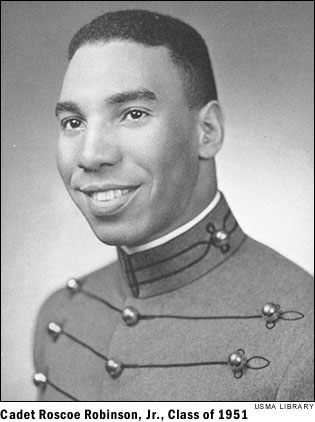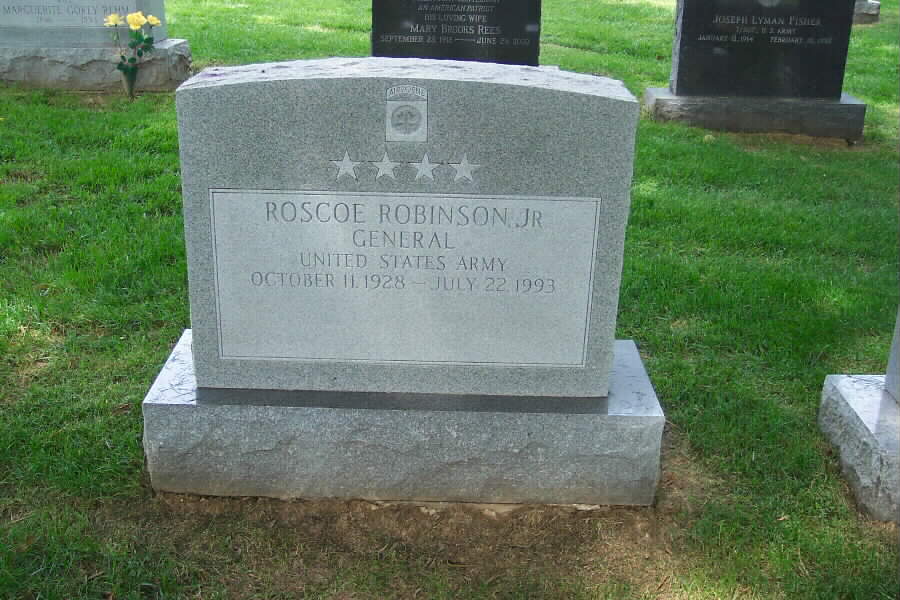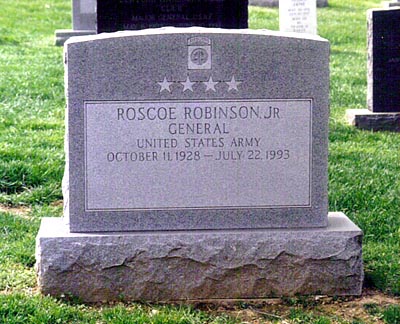Roscoe Robinson, Jr.
Born October 11, 1928 – Died July 22, 1993
Roscoe Robinson was unique, special, one of a kind. He will be remembered for a myriad of reasons.As a class, we are proud of Robby's accomplishments and feel fortunate to have had him as a classmate. While many others have been and will be honored by promotion, it is Roscoe who will be remembered as the first black four-star general to graduate from West Point. It has been said that this recognition was not important to Roscoe, but the future will remember him for this extraordinary achievement. In recent years, all West Pointers have been dismayed after learning about how earlier black members of the Corps were treated. It seems hollow to rationalize that that was how it was at the time, an answer simply not good enough.
Roscoe served in segregated units when first commissioned. How sweet it must have been to have gone all the way from such a tough beginning. The prime source of Roscoe's classmates' pride in him is that he did it all as an infantryman with a great deal of command time and in two wars. He was the type of soldier who set the example and was the role model for thousands of young black soldiers during his 35 years of service and to this day.
Roscoe always had such a warm smile. He was personable, confident and had a great sense of humor. He truly believed he was the best hand-ball player in the Army and was convinced that he was the best paratrooper. He loved sports, his home town of St. Louis and even had a warm spot in his heart for the old St. Louis Browns, with all of their unique experiences.
After joining the 11th Airborne Division following graduation, Roscoe made one of his finest decisions by courting and marrying Mildred E. Sims. They formed an unbeatable team, living and serving together around the world. Roscoe's time as a rifle company commander in the 7th Infantry Division during the Korean War made a lasting impact on him and his desire both to accomplish the mission and to take care of the troops.
His other important assignments included being an instructor at the Airborne School, duty with the military mission in Liberia, and service with the Infantry Assignments Branch. Command of the 27th Cavalry and Division Staff duty with the 1st Cavalry Division during the Vietnam War, Executive Officer to CINPAC and Brigade Commander with the 82nd Airborne Division followed.
In addition to the usual Army Schools, Roscoe attended the National War College and earned an MA degree in International Relations from the University of Pittsburgh. Roscoe's general officer assignments included deputy commander and later commander of U.S. Army Forces in Okinawa, commander of his beloved 82nd Airborne Division, deputy chief of staff for Operations for US Army Europe, and commander of US Army Japan and IX Corps.
His final active duty assignment was as the United States Military Representative to the North Atlantic Treaty Organization. It is interesting to note how often Roscoe's assignment called upon him to work in joint and combined situations. Although he would have been happy serving forever with the 82nd and wearing battle fatigues every day, he made an easy transition, when required, to represent our country in Asia, Europe and Africa. He was one of the very few officers to have such a diverse record of service.
After retiring from active duty, Roscoe served on several corporate boards and as a trustee with the Association of Graduates. He was called on often to serve on committees for the Department of the Army which continued to take advantage of his experience and expertise.
During his final 18 months, Roscoe had a tough time fighting a battle with leukemia. Like everyone engaged in this fight, he had a great many good days mixed with the bad. Millie was there through it all. Roscoe's son Bruce '84, was married in the spring of 1993 and was transferred to the Washington area before Roscoe died. Roscoe took great pride in discussing Bruce's career and when Bruce would relate an anecdote about serving in today's Army, his father always had a few of his own to recall. Another great source of pride to Roscoe was that he and his daughter Carol attended Fort Myer Chapel Service together whenever possible. Being with Carol and his grandchildren gave Roscoe great pleasure. Roscoe received many honors from his friends and admirers. One of special note was dinner which hosted the famous Tuskeegee Airmen of WWII.
In May of 1993, Roscoe was presented with the Distinguished Graduate Award at West Point. What a thrilling experience to be recognized by one's fellow graduates, the people who know you best. Roscoe was having one of his bad days and went in front of the Corps in a wheelchair, but he stood firmly at attention during the playing of the National Anthem. Later, at the presentation in Washington Hall, Roscoe gave a short acceptance speech. He reminded everyone to do their best regardless of the job and then repeated what his mother told him when he left home for West Point. She said, “If they don't treat you right, come on back home.” He reminded us that he stayed. Although he had more ups and downs over the next few weeks.
Roscoe and his beloved Millie were planning one more business trip when the end came. He continued to look ahead.
Roscoe's funeral saw classmates, friends, and Washington Officialdom from the Chairman of the Joint Chiefs of Staff to the Secretary of the Army, the Chief of Staff of the Army, the Color Guard of the 82nd Airborne Division. Classmate and Chief of Chaplains, Kermit Johnson read the Cadet Prayer, Shy Meyer gave a wonderful personal eulogy in a magnificent and very personal ceremony.
Roscoe was laid to rest at the Arlington National Cemetery.
Jose Andres Chacon, Cullum 18250
From a contemporary news report:
“Roscoe Robinson, Jr., a distinguished combat commander and the first black man to become a four-star Army General, died on July 22, 1993 of leukemia. He was 64 and died at the Walter Reed Army Medical Center in Washington, D.C. He had served in Korea and Vietnam, and received his fourth star in 1982, when he was assigned to be the U.S. Representative to NATO's Military Committee. He retired from the Army in October 1983.
“Shortly after graduation from West Point in 1951, he saw action in the Korean War. he served again in combat as a Battalion Commander in Vietnam. His medals included the Distinguished Service Medal, the Silver Star with Oak Leaf Cluster, the Legion of Merit with two Oak Leaf Clusters, the Distinguished Flying Cross and the Bronze Star Medal.
“His posts included those of Deputy Chief of Staff for Logistics in Vietnam, Commanding General of the 82nd Airborne Division and Commanding General of IX Corps in Japan. In 1987, after his retirement, he was named to oversee the work of a panel that re-examined Korean War performance of some black Army units that were much criticized at the time. He also served on the board of the parent company of Northwest Airlines.
“A St. Louis native, he earned as Masters Degree in International Relations from the University of Pittsburgh. A funeral service was held on July 26, 1993 at the Memorial Chapel, Fort Myer, Virginia.”
He is buried in Section 7-A of Arlington National Cemetery, not far from the Tomb of the Unknowns and the Memorial Amphitheater.
April 2000
West Point Auditorium Dedicated
to General Roscoe Robinson, Jr.
Alumni, cadets, staff and faculty, former colleagues, and family members gathered to honor the late General Roscoe Robinson, Jr., USMA '51, during an auditorium dedication on Friday, April 7. Robinson was the first African American to achieve the rank of General in the United States Army. The Thayer Hall auditorium, formerly known as “South Aud” and one of the academy's most frequently used lecture facilities, was named the “General Roscoe Robinson, Jr. Auditorium.”
Among the distinguished guests were Congresswoman Sue Kelly from New York's 19th District; General (Ret) Michael S. Davison '39, former CinC USAEUR and Distinguished Graduate Award Recipient; Robinson's classmates, former Chief of Staff of the Army General (Ret) Edward C. Meyer and former Chief of Chaplains MG (Ret) Kermit Johnson; and Robinson's wife, Mrs. Mildred Robinson.
During his career as an Infantry officer, Robinson was noted for his outstanding leadership and his love for soldiers. His major commands included the 2nd Battalion, 7th Cavalry Regiment in Vietnam; the U.S. Army Garrison, Okinawa (the Ryukus); the 82nd Airborne Division; and the U.S. Army Japan/IX Corps. After earning his fourth star, Robinson served as the U.S. Representative to the North Atlantic Treaty Organization Military Committee. Shortly before his death in 1993, Robinson was recognized with the Distinguished Graduate Award presented by the Academy's Association of Graduates.
During the ceremony, LTC (P) Jose Picart '75 gave a brief history of the Robinson Auditorium Project. It began a few years ago when an officer asked then-First Class Cadet Ronald Thomas, a member of the Class of 1997 who was serving as the president of the Academy's Contemporary Affairs Seminar, why so few African American cadets were choosing a combat arms branch. Thomas replied, “Look around, where are the examples that tell us that an African American officer can be successful in the combat arms?” Thus, the seed was planted and a committee was formed to choose a graduate who would serve as a role model, not just to African Americans, but to all cadets. General Robinson was the committee's choice. 1LT Ronald Thomas followed Picart on the podium and explained the meaning of the memorial. As a young, African American officer, Thomas' presence on the stage was significant, symbolizing the importance of the memorial to West Point's next generation. Thomas said that Robinson “best represented what was great about all Americans” and that he was a “great inspiration to all cadets.”
West Point's Superintendent, LTG Daniel Christman, gave the keynote address. He showed a video clip of Robinson's 1993 Distinguished Graduate Award acceptance speech so that those who didn't know him could get a glimpse of Robinson's character and sense of humor. Christman said Robinson was “first and foremost a combat Infantry soldier”and that his “every fiber reflected the Academy's motto of duty, honor, country.” After the keynote address, the Superintendent and Mrs. Robinson unveiled a dedication plaque and Robinson's son, Major Bruce Robinson, and his daughter, Ms. Carol Robinson, unveiled a career plaque.
Following the unveiling, Major Robinson '84 made remarks on behalf of the Robinson family. He described his father as a man who “loved people, his family and his troops.” He said his father “would feel humble in light of how fortune has smiled on him” and “would be extremely, extremely proud that his fellow alumni thought so much of him.”


Michael Robert Patterson was born in Arlington and is the son of a former officer of the US Army. So it was no wonder that sooner or later his interests drew him to American history and especially to American military history. Many of his articles can be found on renowned portals like the New York Times, Washingtonpost or Wikipedia.
Reviewed by: Michael Howard


